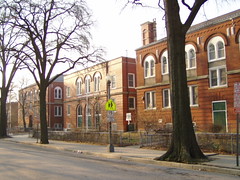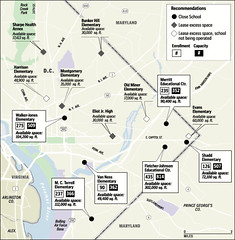Schools brief
 Wheatley School in the Trinidad neighborhood. This school is currently closed pending renovation. The 100(!) students that would normally attend this school are currently bused to another facility. (I don't know if there would be more than 100 students normally, students that may be currently diverted to Webb). Photo by Inked78.
Wheatley School in the Trinidad neighborhood. This school is currently closed pending renovation. The 100(!) students that would normally attend this school are currently bused to another facility. (I don't know if there would be more than 100 students normally, students that may be currently diverted to Webb). Photo by Inked78.I got involved in an e-discussion on the Concerned4DCPS e-list about the school closings, discussed in this Post article, "Janey Proposes 6 Schools To Close: D.C. Moves to Cut Underused Space," and this column by Marc Fisher, "This is no time to be timid." Fisher makes a good point that what is the point if the Superintendent, by closing schools, isn't reducing the number of principals, or staff, or even the maintenance of the buildings.
In the e-discussion I was motivated to write in response to a sentiment that closing schools east of Rock Creek Park is racially motivated. The first writer said "am I correct in stating that no schools in NW will be closed" and the response was "same old, same old." (Technically, Walker-Jones is a school in NW).
Isn't it more likely a function of the number of facilities extant in those areas, and the number of students?
How about a map of the location of every school in the city. My sense is in part that there are more school buildings in NE and SE anyway, based on population, etc.
I think seizing on racism as an explanation in this case does no one any favors, even if I have serious reservations about the accelerated decision making time frame, the disconnect between DCPS planning efforts and other simultaneous planning efforts in other city agencies, etc.
I can't see how deciding to close a school with an enrollment of 90 students is racist, unless there are schools in NW with 90 students enrolled that will remain open at the same time that NE and SE schools are being closed.
My personal preference would be to have more schools, but smaller, rather than large prison-like buildings, in well-kept buildings, preferably historic buildings.
Here's one of the things I wrote:
People do care about crime, safe neighborhoods, and a safe city (I have written far more about public safety issues than I write about education), regardless of where it occurs. Same with education. I don't have children. But I would be a proud citizen if I knew that every child in the city of Washington received an excellent education.
I still have this crazy idea that everybody, regardless of race or class, cares about education, and deep down, about other people. But most people aren't engaged in the community around them, mostly I believe, because they have been told for years (decades) (lives) that they don't matter.
I think a whole community can be re-engaged to improve by (re)building schools as the center of the community. (see the work of the Asset-Based Community Development Institute, and think about extending it more broadly.)
I also suggested doing a version of the "How to Turn a Place Around" workshop (a ground-up design-vision-neighborhood-area improvement method from the Project for Public Spaces) at JO Wilson school, my neighborhood school, about one year ago, but there was no traction.
You talk about crime-ridden streets, I specifically mentioned that the best way to take care of the school grounds would be to way better involve the residents who live in the houses that surround the school on all four sides. The residents are the (potential) eyes on the street, but they aren't engaged, they aren't watching. The school sits undefended.
E.g., I think neighbors should cut the grass of schools, with school-provided equipment, and tend the grounds. Make them park-like, or community gardens. Place the school libraries near the entrance, with a separate entrance, and have the libraries and learning centers also be open to the public after school. And I think every fall and spring there should be a community cleanup within a block radius of the elementary schools, and every student should be out there picking up litter, learning about what happens when something is discarded in such a manner, etc.
What better ways to engage members of the community in school issues, to get them committed to creating Great City Schools.
The workshop idea went nowhere...
But such a workshop should be done at every school in the city.
It should be no surprise to people that many neighborhoods declined after schools were closed in the 1960s and 1970s -- just like neighborhood commercial districts declined as movie theaters and other large attractions-destinations closed during the same period.
Getting back to your original statement, I think the issue is to focus on the crime, the conditions leading to it, rather than yielding to disorder by keeping more under-utilized properties open. More people on the street doing positive things is the best way to take back the street (see Death and Life of Great American Cities). Leaving vacuums promoting disorder is not.
Parks, recreational facilities, and libraries are other "educational" institutions that contribute to quality neighborhoods and quality learning experiences.
DCPS (and most government agencies) have already demonstrated that they aren't good stewards of the properties under their control (while they think these are properties they own, in fact the buildings and properties are public assets that ultimately are held in trust for the citizens of the District of Columbia) -- my joke is that the predominate property management strategy of DC Government agencies is "demolition-by-neglect."
Half-empty or half-full doesn't matter. An underused building still has full maintenance and utility requirements.
 Schools Proposed for Closure, Consolidation D.C. School Superintendent Clifford B. Janey recommended six schools be closed, based on under-enrollment, low academic achievement, building condition and location of schools within walking distance. The 58,000-student school system has lost 10,000 students in the past five years. About 70 of its 147 schools are underenrolled. Washington Post graphic by Mary Kate Cannistra.
Schools Proposed for Closure, Consolidation D.C. School Superintendent Clifford B. Janey recommended six schools be closed, based on under-enrollment, low academic achievement, building condition and location of schools within walking distance. The 58,000-student school system has lost 10,000 students in the past five years. About 70 of its 147 schools are underenrolled. Washington Post graphic by Mary Kate Cannistra.Index Keywords: education



0 Comments:
Post a Comment
<< Home